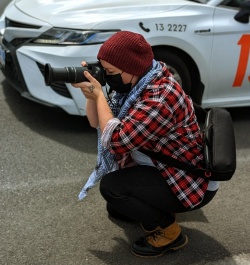News & Media > Editorials > Dominion Anniversary Action Hobart 2019: a reflection
Dominion Anniversary Action Hobart 2019: a reflection
At 8:30am on a mild April morning, twenty concerned citizens organised by Animal Liberation Tasmania entered the foyer of the Department of State Growth building, arranged themselves with placards and banners, and peacefully sat down.
Holding signs that said ''watch Dominion'' and laid bare the failings of the government in handling multiple animal cruelty cases, the protestors had occupied this space specifically to target the Minister for Primary Industries, Guy Barnett, whose ministerial offices were within the building.
As expected, our presence was not appreciated.
Security immediately requested that we leave; we politely declined.
Police arrived and reiterated the demand under threat of arrest for trespass; again we refused. We were there for a purpose.
In 2018, the film Dominion was released to the world, a comprehensive exposé of industry standard practices and abuses routinely enacted against non-human animals across Australia. From the flesh industries to fur, racing and ''pet'' breeding, a documentary of this nature had never before been seen in this country.
Tasmania has the dubious honour of featuring significantly in the film, with footage from three separate slaughterhouses, dairies, as well as chicken and rabbit farms providing locals with an insight into industries that had for so long operated behind the disguise provided by the state's ''clean & green'' image.
People deserve to know the truth, and to see the failings of the system created to support these industries. But more importantly the non-human animals our society so blithely uses deserve to have their truths seen, to have that society bear witness to the deprivation of life and liberty inflicted upon them. To have the world acknowledge their suffering, and to recognise their rights.
And so we targeted Mr. Barnett, as a political representative of and willing participant in this system that seeks to promote the very negation of all non-human animal rights.
In contrast to the high intensity scenes witnessed in the Melbourne CBD, ours was a smaller, quieter affair. And despite initial threats of arrest, eventually both security and police ceded the space to us in what was somewhat of a symbolic victory.
With extensive media coverage that began before the action started (I spoke on ABC regional radio moments after landing in Melbourne to speak at the March to Close All Slaughterhouses two days prior) we contributed to the massive spike in awareness of the documentary, resulting in hundreds of thousands of new views. Indeed Dominion currently has nearly two million views on YouTube alone, bringing the reality of our relationships with non-human animals to countless people across the world. Increasing community engagement with this film was (and remains) a critical weapon in countering societal complacency and undermining trust in the government power structures upon which these industries depend.
Closer to home, we certainly ruffled Mr. Barnett's feathers. The minister labelled us extremists (as was expected). The Dominion anniversary protests were referred to when the Tasmanian Liberals began the reintroduction of their draconian anti-protest laws. And in a session of Parliament discussing the protection of little penguins from dog attacks, Mr. Barnett took umbrage at a Labor minister for referencing Animal Liberation Tasmania’s submission on the issue, in an extraordinary rant that filled three pages of the October 2019 Hansard, again naming us extremists and specifically mentioning our extensive protest history (and the associated damage we have apparently caused to animal exploitation industries in the state).
Unfortunately this year we will not be able to visit the minister to again mark the Dominion anniversary, due to the ongoing SARS-CoV-2 outbreak (we hope he doesn't miss us too much). But we will not be allowing the date to go unnoticed, as we participate in online actions seeking to flood social media with reminders of that day and, most importantly, the reasons why we were there.



